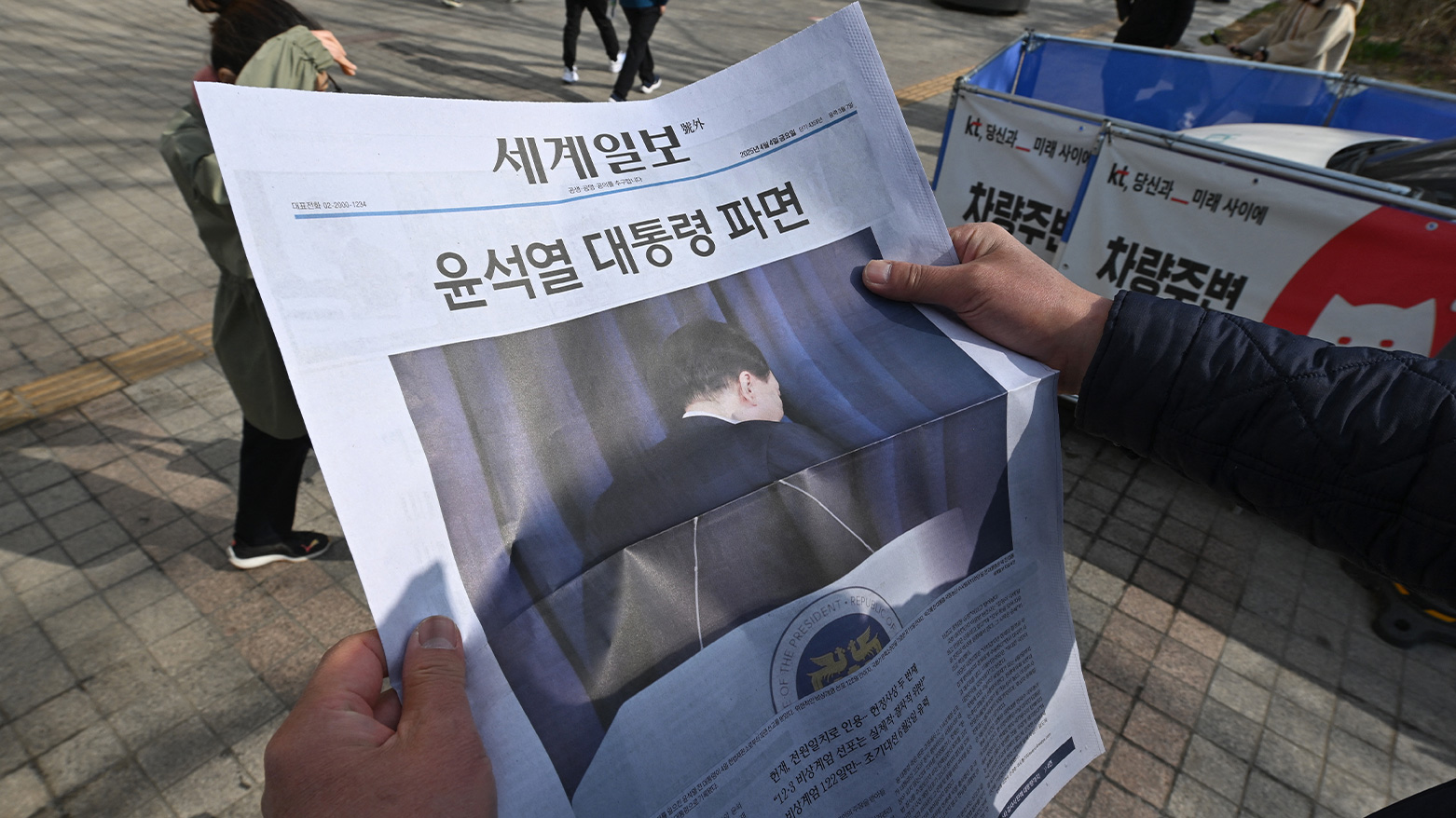Yoon Toppled: Martial Law Gamble Ends in Constitutional Collapse
According to Yonhap News Agency, acting court chief Moon Hyung-bae announced the historic verdict live on national TV, triggering an immediate snap election within 60 days.

By Kamaran Aziz
ERBIL (Kurdistan24) – The South Korea’s Constitutional Court on Friday unanimously upheld the impeachment of President Yoon Suk Yeol, immediately removing him from office over his short-lived imposition of martial law in December 2024.
According to the report by South Korea’s Yonhap News Agency, the historic verdict was delivered live on national television by acting court chief Moon Hyung-bae and took effect immediately, triggering the constitutional requirement to hold a snap presidential election within 60 days. Many expect the election to be held on June 3.
Yoon's impeachment stems from a series of dramatic events that began with his surprise declaration of martial law on December 3, 2024. As detailed in the report by Yonhap, the former president was charged with violating the Constitution and the law by deploying troops to the National Assembly to prevent a vote against his decree, orchestrating raids on the National Election Commission, and ordering the arrest of opposition politicians.
These actions, the court concluded, constituted an abuse of power and a grave threat to the constitutional order.
“The negative effects on the constitutional order and the repercussions from the defendant’s violations of the law are grave,” said acting Chief Justice Moon, citing the court’s decision. “The benefits of protecting the Constitution by dismissing the defendant overwhelmingly outweigh the national losses from dismissing the president.”
Yoon’s legal defense argued that the declaration of martial law was a necessary response to what he described as the opposition party’s repeated obstructionism and attempts to paralyze the state budget. However, according to the Constitutional Court’s ruling reported by Yonhap, this justification was deemed constitutionally baseless.
Under South Korean law, martial law can only be declared in cases of war or an equivalent national emergency—a threshold that was not met.
The court found that Yoon’s actions—including the mobilization of military forces, interference in electoral affairs, and unlawful detentions—violated the most basic tenets of the Constitution and amounted to a betrayal of the public trust.
“By damaging the authority of a constitutional institution and violating the people’s basic human rights through the mobilization of troops and the police, he neglected his duty to protect the Constitution,” Moon stated.
Yoon did not attend the courtroom for the verdict. In a statement released by his legal team, the former president apologized to the nation.
“My beloved people, it was a great honor to be able to work for the Republic of Korea,” he said. “I will always pray for my beloved Republic of Korea and all of you.”
According to Yonhap, the decision brings to an end a four-month-long constitutional and political crisis that began with Yoon’s declaration and culminated in his arrest, detention, and eventual release ahead of trial. The impeachment trial lasted 111 days from its submission on December 14, the longest such case in South Korean history.
In response to the court’s ruling, acting President and Prime Minister Han Duck-soo pledged to ensure a peaceful transition and oversee the upcoming election with fairness and transparency. “I will do my best to manage the state and guarantee a smooth democratic process,” he said.
The verdict drew sharply divided responses across South Korea.
As reported by Yonhap, anti-Yoon demonstrators outside the presidential residence in central Seoul erupted in tears and applause, holding national flags and banners calling for justice. In contrast, Yoon’s loyalists reacted with outrage and disbelief, with some collapsing to the ground in anguish and others shouting profanities at the court.
Political parties also issued swift reactions. The ruling People Power Party announced it would “humbly accept” the verdict, while the opposition Democratic Party (DP) hailed it as a decisive victory for the South Korean people. DP leader Lee Jae-myung, considered the front-runner for the upcoming election, declared from the National Assembly: “The great people recovered the great democratic republic, the Republic of Korea. Together with the people, we will restore the destroyed livelihoods, peace, economy, and democracy.”
Polling data published by Gallup Korea and cited by Yonhap showed growing public support for the opposition, with 52 percent favoring an opposition candidate in the upcoming election and just 37 percent backing the ruling bloc. Lee Jae-myung led as the preferred candidate with 34 percent support, followed by Labor Minister Kim Moon-soo of the ruling camp at 9 percent.
Yoon’s legal troubles are far from over. According to Yonhap, he is also facing criminal charges for inciting insurrection through his martial law decree—a serious offense under South Korean law punishable by life imprisonment or even death. He was initially detained in January but released in early March following a court decision deeming his detention invalid. He will now face trial without physical detention.
This verdict marks only the second time in South Korea’s history that a sitting president has been permanently removed from office by impeachment. The first occurred in 2017 with President Park Geun-hye, who was impeached and imprisoned on corruption charges.
As South Korea prepares for a fresh presidential vote, the removal of Yoon Suk Yeol stands as a stark reminder of the strength of constitutional democracy in the country—and of the grave consequences for those who attempt to undermine it.